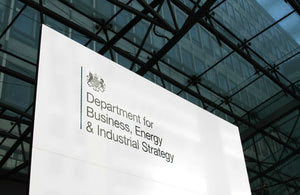Magic beans and buzzing coffee win international science award

Projects to grow drought resistant beans and create energy from coffee waste are among the winners of the 2018 Newton Prize.
The annual £1 million Newton Prize recognises pioneering research and innovations that come from international partnerships between the UK and Newton Fund partner countries around the world, with each project helping to solve global development challenges.
Business Secretary Greg Clark said:
These prize winning international projects are uniting the brightest and best minds from across the globe to transform lives now and for generations to come. The Newton Prize and Newton Fund create, cultivate and celebrate these partnerships and I congratulate all the winners on their excellent work.
This year the Newton Prize focussed on partnerships between the UK and Brazil, Chile, Colombia and Mexico. The 2019 Newton Prize will celebrate partnerships between the UK and China, Indonesia and the Philippines.
Winning projects
The winning 5 projects are:
Improving the lives of the Guarani people by saving the Atlantic Forest (awarded up to £200,000)
This project between researchers at University College London and the Indigenous Work Centre in Brazil is helping the indigenous Guarani restore the Atlantic Forest in their territory. By drawing from Guarani ancestral agricultural knowledge and established agroforestry techniques, and by promoting a better understanding of the importance of indigenous peoples for environmental conservation, the team are supporting the preservation and restoration of the forest and improving the wellbeing of Guarani communities. The results of the project could also inform conservation efforts elsewhere.
Strengthening energy infrastructure to withstand extreme weather and natural disasters (awarded up to £200,000)
Scientists at the University of Manchester and University of Chile are using mathematical models to strengthen power systems in Chile and other countries vulnerable to environmental hazards, helping energy providers prevent or reduce widescale electricity outages. It will inform planning practices to help shape a robust, cost-effective and low-carbon Chilean transmission network. National and international networks developed through the project have built the capacity of researchers in the wider region, and the potential impact of this project could benefit countries affected by extreme weather and natural hazards worldwide.
Turning environmentally damaging coffee waste into electricity (awarded up to £98,327)
Researchers from the University of Surrey and University of Antioquia in Colombia have found that environmentally damaging coffee waste could be turned into electricity. They discovered that if they fed coffee waste to microbes, the tiny creatures would eat it, producing energy. This energy could then be captured in the form of electricity. The researchers are now developing small fuel cell devices, and they hope to engage with large coffee companies in Europe to adopt the same approach to treating their waste if used successfully in Colombia.
New drought resistant beans for sustainable food supply in Mexico (awarded up to £199,019)
Researchers from the University of Sheffield and the Institute of Biotechnology at the National Autonomous University of Mexico are developing bean varieties to combat drought-related crop losses. The researchers have potentially found out how to reduce bean water use by up to 40 percent, potentially saving up to three percent of Mexico’s entire agricultural water use. The project has the potential to secure a reduction in rural poverty, while improving bean yields and minimising fertiliser use will also benefit soils, reduce desertification and improve water quality.
Documenting the past for a more peaceful future (awarded up to £192,400)
The final Newton Prize, the Chair’s Award, was given to a project between Goldsmiths University of London and the Alberto Hurtado University, in Chile. The research team has shown how the act of documenting politically-motivated imprisonment, torture or execution is an important way of resisting human rights violations. It allows affected societies to appreciate – often for the first time – the depth and scale of the trauma suffered by fellow citizens. This new line of research will support public policy and measures that help to move towards a more peaceful future.
Newton Prize
This is the second year of the Newton Prize, which is part of the Newton Fund. The Newton Fund builds research and innovation partnerships with 17 partner countries to support their economic development and social welfare, and to develop their research and innovation capacity for long-term sustainable growth. The prize allows researchers to take their existing Newton Fund projects to the next level.
The Newton Fund is managed by the UK Department for Business, Energy and Industrial Strategy (BEIS), and delivered through 7 UK delivery partners, which includes UK Research and Innovation (comprising the 7 research councils and Innovate UK), the UK Academies, the British Council and the Met Office.











Responses